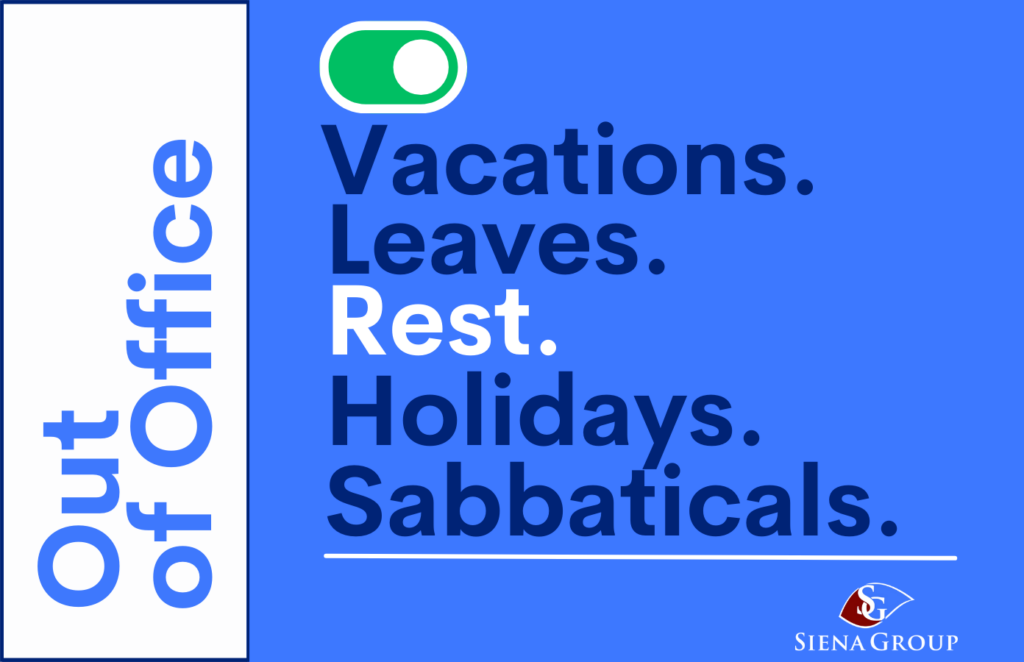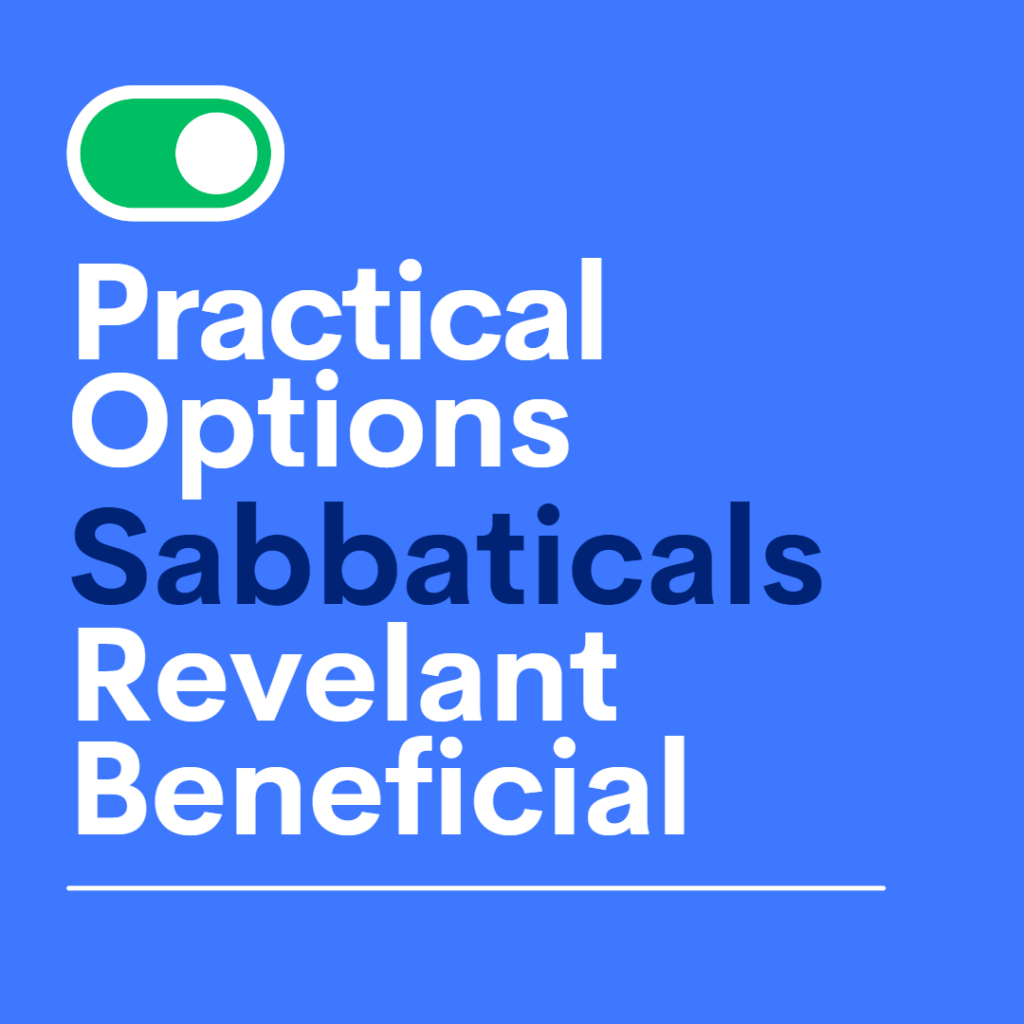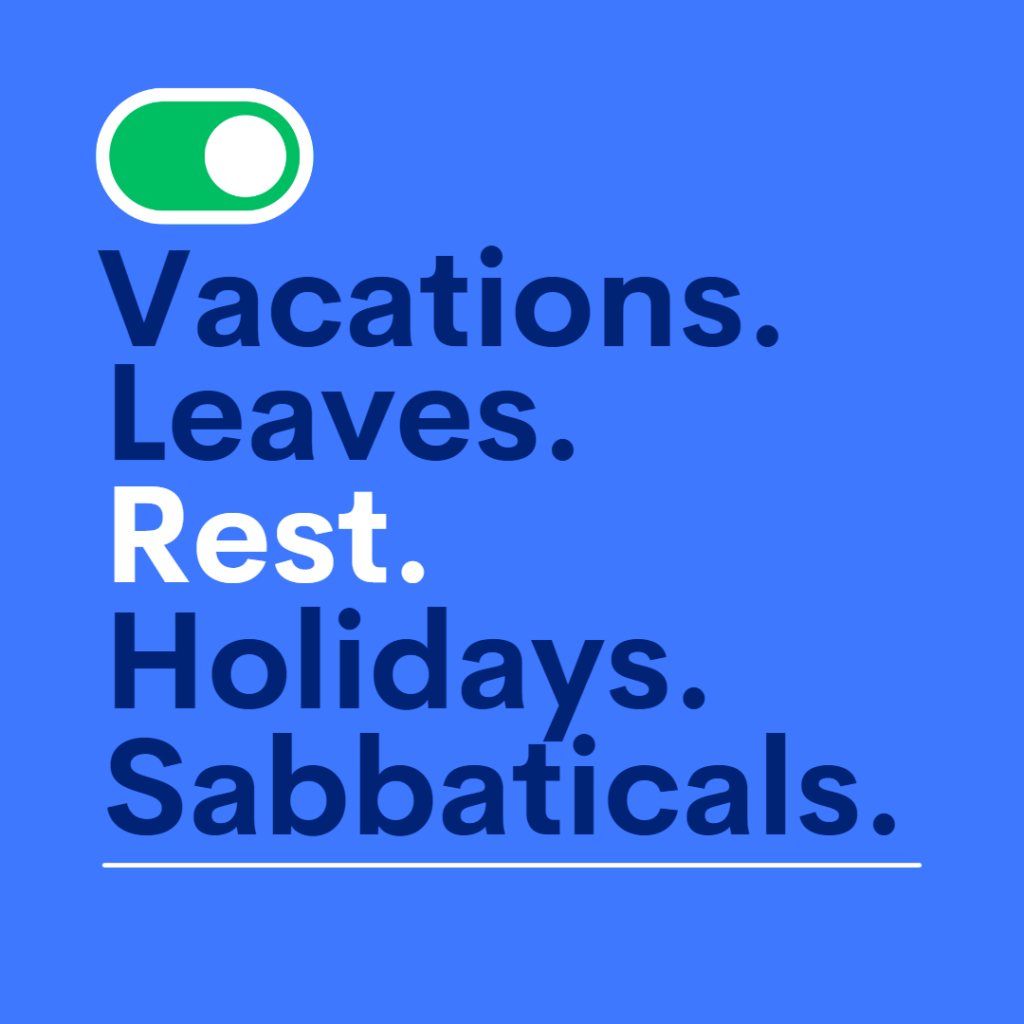What is a “Real” Vacation?!?
by Keith Brown, President & Owner, Siena Group.

Summer is around the corner. Kids everywhere are eyeballing a break from school. Moms and Dads probably already have some time planned to hit the beach or the mountains or… wherever you can stop and rest.
But what really constitutes a vacation? Though this seems an odd question to ask, in my experience, it is actually harder to define than you realize. As a younger man, married and with two young kids back in my days in Georgia, I had an older friend at church who offered me some sage advice as we were getting ready to go on a vacation to visit family in Florida.
“How long are you going to be gone?” he asked… fully expecting for me to say, “A week.”
He was right. We had a very busy week planned: 3.5 days with one side of the family and exactly 3.5 days planned with the other side, with about a 92-minute travel time in between. Busy. Cramming as much as possible as we could in our few days off. Vacation? Nibbling around the edges maybe… but, was it a real vacation? Upon reflection these many years later, my answer would now be a resounding “NO”.
My learned and wise friend shared a ‘secret’ he learned all too late in his life and wanted to pass it along to his younger friend who had a lot of runway. Vacation, in his experience, started on day 7.
Let me explain.
- Get home from work on Friday and start the pack and load in earnest.
- Plan to pile in the van early on Saturday morning to make the drive to [fill in the blank].
- Get there 8-12 hours later, unload, and settle in.
- Begin to enjoy various activities with your nuclear and/or extended family and friends.
- Visit an amusement park (fun… but are those really relaxing?!!), hit the beach (that definitely qualifies), take a hike on a mountain trail, or any number of other activities.
- The days fly by, and you are doing your best to decompress… when you realize it is all of sudden already Friday – DAY 7.
- That was fast! It’s over already?!
- You’ve had fun, but you are tired.
- Your brain kicks in, and you are already looking at the weather for the long schlep home.
- You start wondering about work and may even take a peek at your laptop or phone to check in. Or – better yet – did you actually turn OFF your work email notifications at all?
- Yes, you made good memories. Yes, you spent time together. Yes, you crammed a lot in, was there truly rest? Did you really vacate?
Here’s the day 7 secret that my friend shared with me: always plan ahead and take two weeks off! In his experience, the very first time he planned a two-week vacation, something happened on that magical day 7: RELIEF.
In the common scenario above, you’ve been busy, and the days fly by with fun and food and family – and Friday hits… and the get-back-to-life panic begins. But, THEN you realize you have another entire week ahead to rest!!! Now, that’s when real vacation and real stress relief and real rest happen! You wake up on day 7, and have 7 more days to go! Now – instead of coming home needing a “vacation from a vacation“, when you come back to work 14 days later, you are truly refreshed, renewed, and ready to knock it out of the park!
No matter the approach or method, “Taking vacations is… hugely beneficial to our wellbeing“. According to clinical psychologist Francine Lederer, “The impact that taking a vacation has on one’s mental health is profound. Most people have better life perspective and are more motivated to achieve their goals after a vacation.” [From “Give Everybody the Month of August Off”, Jacobin]. The overall sentiment of the article: “It’s clear: taking time off of work is extremely good for you.”
In this blog, we’ve taken a deep dive into how vacations (or holidays, as they like to call it) in Europe evolved, plus we expand on the idea and practice of sabbaticals.
Did Europe Get it Right?
Believe it or not, “paid vacation is mandatory across most of the European Union, with a minimum of four weeks off“! In fact, “most Spaniards are required to take a certain amount of their vacations in August, and many companies shut down for the entire month“! (both quotes from Jacobin).
I’ll admit – it was highly annoying as an engineer working on a critical project to have to plan our entire schedule around August. Major portions of our equipment were sourced from suppliers in Europe. If lead times were such that equipment deliveries were due to hit anywhere close to August, we had to adjust our scope – because it seems like the whole of Europe was stinking closed!!!

So, how did this culture of taking a month-long vacation in European countries originate? The short version is that politicians (both on the left and the right) got involved to drive a means to an end. There are lots of complicating factors and enough content to keep you reading for a bit to be sure, but like many ‘movements’ seeking to achieve a particular goal, what it ultimately did was create a culture that highly valued vacations. “By the time World War II began, the working-class vacation had become both an ideological goal and a concrete source of satisfaction across political lines. And so, in decades that followed the war, Europe’s powerful unions continued pushing to expand them. By the 1980s, laws in a number of European countries guaranteed workers five weeks of vacation each year.” (JSTOR Daily)
It is hard for us Americans to understand how this even works. How in the world can companies be profitable if they take an entire month off? How can people afford to take that much time off? With the world getting ever smaller, these policies of guaranteed time off has to change… right? Again, without getting into all the hairy details, several studies indicate that European workers are more efficient that their American counterparts. They get more done in their working time than we do – partly because they KNOW that time off is coming, and they have to deliver. Interesting, isn’t it?
In order to truly establish this kind of collective vacation en masse, governments had to get involved. I’m not going there and certainly do not want to overly politicize this topic. I just found it interesting that governments of all kinds, with diverse ways of governing (think socialism, fascism, democratic, and more) decided to use vacations as a way to control their workers. I have a hard time believing that any federal mandates would ever be handed down in the US to dictate vacation time, given how influential big business is on our government. If the US were to embrace month-long shut-down mandates, this kind of change would have to be more organic than that. Companies would need to think differently about vacations and how they impact their team’s productivity.
Going down this rabbit hole even further, as a recruiter, I work with many top-notch companies. They range from family-owned operations that are fairly small to larger, multi-national companies with dozens of manufacturing plants. Yet, no matter the size of the organization, the vacation allotments for new hires are pretty consistent: most new employees get 2 weeks off. That’s where the offer commonly starts! Does it matter that you are a 20-year vet? Nope. Do companies adjust and increase it a bit? Yes, and it typically ends up at 3 weeks. But the simple idea that vacation policies dictate that a new hire – independent of their total years of experience – must start at 2 weeks is, well, silly in my view. Just because you haven’t been with one company for 20 years shouldn’t discount the fact that you’ve worked for 20 years! Why would someone with that level of experience be offered the same amount of vacation as an incoming engineer that just graduated college? Do we expect those 20-year vets to produce at higher levels than the brand new 24-year-old? Most of the time, that answer should be yes. Therefore, additional vacation should be warranted. Yet, the standard “2 weeks off” is policy driven, and it is still the prevailing sentiment in the US. In other words, it just is.
On the flip side, there are several companies, usually service-related and outside of manufacturing, that have started to offer “unlimited” vacation. Take what you want when you want it. Sounds like a dream, right? Yet, the reality of this approach – though still very rare to see (SHRM cited it at less than 2% of companies from a study a couple of years ago) – is that it actually tends to generate more anxiety amongst workers, not relieve it. Nearly opposite of that, some companies require that employees take at least two weeks off, one of which must be consecutively at least one week. Based on everything that I’ve read, this approach gets closer to what Europe has learned: vacation matters and should be strongly encouraged as it ultimately benefits both the employee and the organization.
What about Sabbaticals?
What is a sabbatical? Interestingly, though we all have a sense of the meaning of the word, the definition is varied and points to why the idea is foreign to American manufacturing workers and leaders.
According to the Oxford Dictionary, the definition of a sabbatical is “a period of paid leave granted to a university teacher or other worker for study or travel, traditionally one year for every seven years worked.” The Wikipedia version is a bit more general, defining it as “a rest or break from work; an extended period of time intentionally spent on something that’s not your routine job.” I find it fascinating that an agricultural conscript based in Biblical times somehow morphed into one that was accepted at the highest levels of academia! Without getting into the history and derivation of the word (just read the Wikipedia page and check out the references), the point is that a sabbatical is a full and extended break from what is normal for you.

In digging into this topic for this article, I discovered a TON of content out there… and nearly all of it is less than a couple of years old. It is very normal to find a tremendous amount of information on any given topic at any given moment. But, finding relevant and thoughtful articles based on recent studies points to something more urgent: it’s because of what people and thought-leaders are seeing in the workplace right now due to any number of reasons, not the least of which was the pandemic. High levels of stress, burnout, ‘quiet quitting’, and similar are having a major impact on the workplace, and something needs to change for the better.
Sabbaticals can come in all shapes and sizes, depending on the organization and the employees. They can be paid or unpaid, and sometimes even occur when people are between jobs – provided they have the financial means needed for this extended time. One of the best ways I found to describe a sabbatical is by comparing it to a vacation.
“The difference between a vacation and a sabbatical is like ‘the difference between taking a power nap and getting a full night’s sleep’.”
“What is Life Like When We Subtract Work From It“, The Atlantic
I took a dive into the comparison between the US and European cultures as it relates to time off, and it is no surprise that a sabbatical in America is quite foreign to us!
“In societies that have come to be defined by the Protestant work ethic, taking such prolonged periods away from work can feel all kinds of self-indulgent. Indeed, data suggests that over half of Americans fail to take their full holiday entitlement (which is already much lower than most other countries), if they even take any holidays at all in a given year. So the thought of taking several weeks off is understandably anathema to many.
Yet, research from the University of Washington argues that sabbaticals can actually be hugely beneficial for employees and employers alike. The researchers found that people who take sabbaticals nearly always return with a fresh sense of confidence, renewed purpose, and a pronounced sense of voice.”
[From How Sabbaticals Help Our Careers: Forbes]
Another great article from Forbes, “A Strategic Sabbatical Can Help Your Employees Survive Burnout,” digs into several aspects of a sabbatical from the perspective of a CEO that co-founded a company. Though a very short article, I found it highly profound! The author states, “Everyone who works in your organization is essentially a volunteer, especially in today’s labor market.” Wow! Though I’ve never thought about it that way, he flat-out nails it when describing the war on talent that we are all bantering about.

As is typical, Harvard Business Review dug into sabbaticals in a lot of detail, performing a “rigorous study” on the topic. “Research: The Transformative Power of Sabbaticals“, (Harvard Business Review), gets into the meat and potatoes a bit on the various types of sabbaticals, their implications, and even how to use them effectively in an organization. This is a GREAT resource!
I have two personal examples with friends that took a sabbatical – one was a Senior Marketing Leader at McDonald’s, and one is a close friend and Senior Pastor at our church. In HBR’s definition, I believe both were “quests” – a full break from routine for an extended period that included rest, reconnecting, time with friends and family, some adventuring, alone time away, lots of reading, and ultimately renewal.
Interestingly, the one friend at McDonald’s did exactly what HBR described about a ‘quest’ – he left the company about a year after returning from his sabbatical and shifted into entrepreneurial mode, becoming a franchise owner of a different beloved fast-food restaurant. My Senior Pastor came back refreshed, well-read, and passionate about what was next for our church, ready to lead and push forward.
The same HBR article gets a bit into the benefits and pitfalls that can occur when sabbaticals are implemented. I’m not naïve enough to believe any one leader or any organization can just flip the switch and all will be roses and rainbows. Even so, it is very compelling to consider.
“Regardless of the sabbatical they chose, and in spite of any harsh experiences, elements, or emotions that many would face, every one of our participants reported a positive transformation. So the question isn’t whether sabbaticals change employees’ work for the better, but how and how much. Our research offers some clarity into different options for sabbaticals and their consequences, which can help both employees seeking a change and organizations looking to better support these workers.”
[Again, from the HBR article]
In a personal perspective article from Business Insider, “I Got Paid to Not Work for 2 Months“, the author describes her sabbatical experience and how it ultimately impacted her outlook on pretty much everything. “Having the dedicated sabbatical time to completely focus on my family taught me the value of staying wholeheartedly in the moment.” Powerful. She goes on to talk about how it affected her retention at – and loyalty to – the company. It was their investment in her that ultimately benefited both her and the team. Do you think that I could court her away to another organization? No chance!
Another recent article from Psychology Today highlighted yet again the impact that sabbaticals had on the author’s life, in this case as a college professor. It was huge for him in many different ways. He similarly concluded, “Not only are sabbaticals attractive to job seekers, but they also offer opportunities for employees to improve their mental health, consider a work-life balance, and develop creative solutions to issues they were facing at work. Moreover, paid sabbatical leaves can encourage employees to stay loyal to a company.”
Finally, the SHRM article “Sabbaticals Could Be the Solution to Employee Burnout” gets into how to implement a bit more, highlighting “the why, determining eligibility, how to cover the absence, and being prepared for the employee’s return.”
In summary, based on quite a few recent studies, sabbaticals should be something you may want to explore as an organization. Leverage SHRM and resources like The Sabbatical Project to better understand how it would be implemented and leveraged for your team.
Though I’m not one to get political, especially in this forum, I do think that we as Americans need to rethink our collective vacation/leave/sabbatical policies as we better understand the implications – and costs – of attrition and retention due to frustrated, stressed-out, and burned-out team members.
It’s time to get creative and develop lasting solutions that work! Many companies see offering sabbaticals as a way to retain existing employees or attract new talent by providing them with the most valuable resource: time. Sabbaticals may not work in every business setting, but the underlying work-life balance principle — that employees and leaders need time away from work to best maximize their productivity — is applicable in every business!
No, it won’t be easy. But in this day and in this market and in our country especially, maybe it is time to consider a different approach to investing in your team via sabbaticals.
Bringing it Home🏡

I believe it is safe to say that vacations are needed for every person that works for a living. I would strongly encourage all of us – and I’m preaching to myself in this case as well – to figure out how to take 2 weeks off in a row at least once a year.
As a small business owner, this will not be easy! But, IT IS IMPORTANT! Stay tuned for an upcoming blog that will detail a bit about my own personal career journey: as a direct result of burnout (life-work balance!), I made a dramatic career shift away from manufacturing and into recruiting. As I made the jump into small business ownership, I vowed that I would protect myself against burnout again…
But, after so many years in the recruiting world, I recently realized that I really haven’t taken that sage advice from so many years ago. So, I decided that it was time to adopt proven wisdom and take a ‘real’ vacation! When this blog publishes, I will be returning from a 2-week vacation in Portugal! I’m eager to report back to share my own thoughts on taking time away. Who knows, maybe taking a European-style vacation in a European country will give me a REAL perspective on what it truly means to take a REAL vacation!
At Siena Group, we are your Thermoforming Talent Partner! With more than 30 years of experience in manufacturing, hiring & recruiting talent, we bring a greater understanding of the companies we partner with and the candidates we pursue. Let’s Strengthen Your Search!
Share our post with others
Love what you see? Share it with your connections now.
